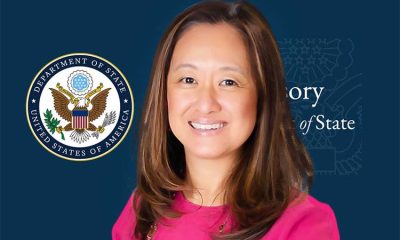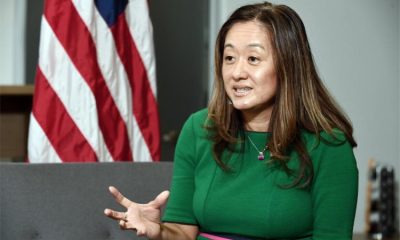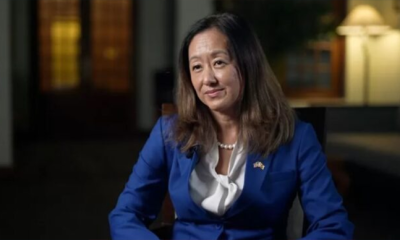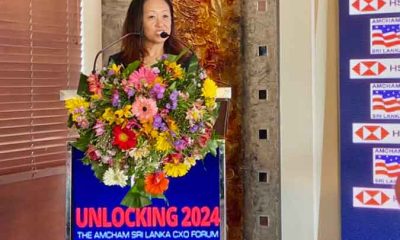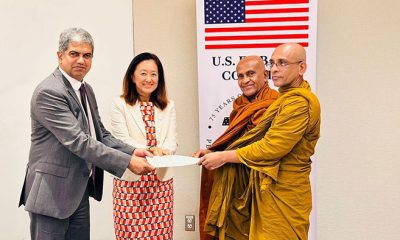Features
As Julie Chung morphs into Elizabeth K Horst…

by Malinda Seneviratne
Ambassadorial aspirants hardly break a sweat when drafting submissions to the US Senate Committee on Foreign Relations, not even in pre-ChatGPT days. They’ve been in the business of US diplomacy long enough to know what ‘US Foreign Policy’ is. They know what the listeners want to hear. They have templates to choose from. And therefore the opening statement made on May 9, 2024 to the Committee by Elizabeth K Horst, nominee to be the US Ambassador to Sri Lanka, is more or less par for the course. A parenthesis is called for here.
(US foreign policy, broadly, is about (ab)using economic and military power to coerce governments to bend and twist to ensure that US strategic and economic interests are obtained. The US has, does and will leverage the very same power to enact global rules to serve these purposes. US rhetoric about democracy and human rights is hogwash. What Noam Chomsky wrote in 1992, ‘What Uncle Sam really wants,’ is a quick, easy and edifying read for those who want the details.)
So. Elizabeth’s foreign-speak is hardly any different from the testimony of her predecessor-to-be Julie Chung submitted to the same committee on October 20, 2021. It is a tad different from the submissions of Aliana B Teplitz, Atul Keshap and Michele J Sison but the variance was essentially over time-specific issues.
Elizabeth is as laughable as was Julie. Both are adept at tossing out platitudes. Both have trotted out notions such as justice, accountability and reconciliation. Julie spoke about ‘unimagined violence and continued ethnic and religious divisions,’ betraying a scandalous imagination-deficit. Elizabeth is as ignorant of the notion ‘charity begins at home,’ when she talks of ‘marginalized populations.’ Both are citizens of and represent a country which consistently re-writes definitions of such things or ignores them altogether.
Today it is about Israel not having crossed some “US red-line” clearly amenable to arbitrary movement, geographically and metaphorically, with regard to attacks on Rafah. White House spokesman John Kirby says, ‘The US does not believe Israel has launched a full-scale invasion of Rafah in southern Gaza.’ So, an invasion of a lesser scale is sanctioned by implication.
Kirby adds, that the US ‘[does not] support,’ and ‘won’t support a major ground operation in Rafah.’ Operations are not limited to the ground, of course and we’ve seen a lot of that.
The bottom line, drawing from Elizabeth’s laughable talk of ‘marginalized populations,’ is that the USA, throughout its history, has not only marginalized populations, but have decimated them as well. In the case of Palestinians, the US has been pretty consistent in supporting genocide; yes, long before President Biden earned himself the sobriquet ‘Genocide Joe.’
Elizabeth claims she will reiterate commitment to ‘the rules-based international order.’ What rules, though? Those of the International Criminal Court (ICC) perhaps? Well, not too long ago, the then White House National Security Advisor John Bolton threatened judges of the ICC if it moved to charge any American who served in Afghanistan with war crimes. In other words, the USA was demanding impunity, much like its client-state, Britain, which self-legislated immunity from ‘vexatious’ prosecution for war crimes with the would-be defendant deciding on what would be irksome. So much for accountability, truth, transparency and justice! Hence, the giggles over the funnies crafted by Julie and Elizabeth.
How about WTO rules? Well, in what was then a pretty much unipolar world, the USA with the support of not-so-strange ideological bedfellows or by cajoling or arm-twisting others replaced the General Agreement on Tariffs and Trade (GATT) in 1994 supposedly to usher in an era sans subsidies or protectionism of any kind. Today, no nation on the planet has shown the kind of protectionism demonstrated by the USA. As for subsidies, Washington has never stopped buttressing its agriculture sector and of course the arms industry, creating or fueling conflicts all over the world and even making its own citizens cough up bucks so that the arms manufacturers reap in mega profits. Yeah, Ukraine comes to mind.
What’s all this got to do with the likes of Julie and Elizabeth? China. Simple.
Julie alluded to Sri Lank’s strategic location, flagged global maritime lanes and trading routes and slipped in the key US strategic concern: the Indo-Pacific architecture which, she vowed, she would do her best to keep ‘free and open.’ Free and open are lovely words but are not even distant relatives of deed. Where monopoly is possible, the USA never budged, but when that’s not possible, Washington talks of equal access.
When the Committee questioned Elizabeth on the possibility of urging Sri Lanka to maintain a moratorium on Chinese research vessels entering Sri Lankan waters, it is reported that she said she will discuss the moratorium issue but also ensure fair and equal access to ships from the US.
Interesting. Pushing for a moratorium means the USA does not want any Chinese research vessels in Sri Lankan waters. Equality is a word that then would be applicable to both access and its denial. In other words, Elizabeth, if she wrangles a continued moratorium would desist from any US involvement in Sri Lanka, not in the seas and not on land. No purchasing of ‘civil society’ via ‘educational programs,’ no indoctrination, no CIA/NED operations, covert or otherwise, nothing that could even vaguely be construed as ‘research.’ But, as mentioned, talk is cheap and words are for convenient manipulation of meaning, for Elizabeth, like Julie, is also planning to work with non-state actors. More ‘rules’ in the US version of a rules-based international order, one is prompted to ask? We will return to this presently.
She speaks of ‘collaborative maritime security,’ and ‘stability throughout the Indian Ocean,’ as though she envisages some kind of equal partnership between the USA and Sri Lanka, but that’s all nonsense, need one even say?
Bill Haggerty, Senator for Tennessee, is reported to have raised alarm over China’s use of debt-trap diplomacy and highlighted Sri Lanka’s leasing of both the Hambantota and Colombo ports which provided China with a “strategic foothold” in the region.’ Now aren’t strategic-footholds what US foreign policy is all about? Sauce for the goose and the gander, so to speak. As for debt-trap diplomacy, that’s an old trick — the USA employs it through the Bretton Woods institutions, China is upfront (if one were to buy the Chinese debt-trap story).
More specifically, Haggerty had noted Sri Lanka’s ‘opposition to “a renegotiation of a status of force agreement (SOFA) and the Millennium Challenge Corporation (MCC) compact”.’ SOFAs, Elizabeth probably knows, are multilateral or bilateral agreements that establish the framework under which U.S. military personnel operate in a foreign country and how domestic laws of the foreign jurisdiction are waived with respect to U.S. personnel in that country.’ So a SOFA with Sri Lanka is essentially an inking of a ‘strategic foothold.’
What does Elizabeth say? She opines, ‘I think we can go a long way at doing more public diplomacy and engaging with all stakeholders on the ground beyond the government. With civil society, with journalists, and with those who feel affected by such projects and the future.’ But wait, if ‘equality’ is what is sought, would she applaud the idea of a Chinese SOFA?
A busybody she unabashedly is and one who doesn’t give a hoot about crossing all red lines pertaining to diplomatic protocols. In short, she is saying, ‘I will interfere, I will prod, I will poke, I will purchase, I will do what it takes to turn footprint into foothold to kick-ass as and when necessary.’
So when she talks of maritime security or about stability throughout the Indian Ocean, she’s talking of US security interests in and US control of the region. Nothing free-and-equal in any of that.
Why do US officials, in Washington and representing Washington, so easily trip when they speak? Why do they contradict themselves? Why do they toss out lofty ideals only to defecate on the same when questioned on specifics? Why has almost everything that comes out of Washington, even such a trivial matter such as confirming the appointment of a nominee to a diplomatic posting, end up being about China?
In a word, fear. China owns close to a trillion US dollars or 9.95% of foreign-owned US debt. China, according to Washington’s own narrative, has taken over the African continent. No jack-boot diplomacy there. No guns in booty out, as has been the way of the USA and her allies in Europe for centuries. Fear, perhaps, but envy too, one must wonder.
That however does not explain contradictions and incoherence, and we’ve seen shiploads of it in recent times, haven’t we? What’s come out of Washington with regard to the war in Ukraine, the genocide taking place in Gaza and of course rhetoric and legislation with regard to that linguistically flawed term ‘anti-Semitic’ has been unbelievably sophomoric. The response to events and statements have been vague at best but more typically indicative of a cornered pickpocket, frothing at the mouth and muttering incongruities. Something is said but without the realization that the statement is full of holes and that the arguments can be thrown back to call out positions taken, things done and said in similar situations.
The US is showing all the signs of an entity that has lorded over one and all and gotten away with murder for so long that when things go wrong it is simply and utterly incomprehensible. The world is no longer uni-polar. De-dollarisation is no longer an improbable country in some other universe; it’s birthing as we speak. European unity is no longer a given and neither is its status as partner or rather adjunct of the USA. Emmanuel Macron, for example, stung by reversals in Africa is strutting around in New Caledonia, perhaps to purchase some ‘feel-goodness’ having found himself in drastically reduced circumstances.
And we have the likes of Elizabeth Horst unable to sum up enough diplospeak to sound half-way coherent. Julie Chung was all strut and her excellent public relations couldn’t really hide her viceroy-like operations. We have yet to see Elizabeth Horst’s public persona. Frills aside, it would be optimistic to expect her to be any different.
Features
The heart-friendly health minister

by Dr Gotabhya Ranasinghe
Senior Consultant Cardiologist
National Hospital Sri Lanka
When we sought a meeting with Hon Dr. Ramesh Pathirana, Minister of Health, he graciously cleared his busy schedule to accommodate us. Renowned for his attentive listening and deep understanding, Minister Pathirana is dedicated to advancing the health sector. His openness and transparency exemplify the qualities of an exemplary politician and minister.
Dr. Palitha Mahipala, the current Health Secretary, demonstrates both commendable enthusiasm and unwavering support. This combination of attributes makes him a highly compatible colleague for the esteemed Minister of Health.
Our discussion centered on a project that has been in the works for the past 30 years, one that no other minister had managed to advance.
Minister Pathirana, however, recognized the project’s significance and its potential to revolutionize care for heart patients.
The project involves the construction of a state-of-the-art facility at the premises of the National Hospital Colombo. The project’s location within the premises of the National Hospital underscores its importance and relevance to the healthcare infrastructure of the nation.
This facility will include a cardiology building and a tertiary care center, equipped with the latest technology to handle and treat all types of heart-related conditions and surgeries.
Securing funding was a major milestone for this initiative. Minister Pathirana successfully obtained approval for a $40 billion loan from the Asian Development Bank. With the funding in place, the foundation stone is scheduled to be laid in September this year, and construction will begin in January 2025.
This project guarantees a consistent and uninterrupted supply of stents and related medications for heart patients. As a result, patients will have timely access to essential medical supplies during their treatment and recovery. By securing these critical resources, the project aims to enhance patient outcomes, minimize treatment delays, and maintain the highest standards of cardiac care.
Upon its fruition, this monumental building will serve as a beacon of hope and healing, symbolizing the unwavering dedication to improving patient outcomes and fostering a healthier society.We anticipate a future marked by significant progress and positive outcomes in Sri Lanka’s cardiovascular treatment landscape within the foreseeable timeframe.
Features
A LOVING TRIBUTE TO JESUIT FR. ALOYSIUS PIERIS ON HIS 90th BIRTHDAY

by Fr. Emmanuel Fernando, OMI
Jesuit Fr. Aloysius Pieris (affectionately called Fr. Aloy) celebrated his 90th birthday on April 9, 2024 and I, as the editor of our Oblate Journal, THE MISSIONARY OBLATE had gone to press by that time. Immediately I decided to publish an article, appreciating the untiring selfless services he continues to offer for inter-Faith dialogue, the renewal of the Catholic Church, his concern for the poor and the suffering Sri Lankan masses and to me, the present writer.
It was in 1988, when I was appointed Director of the Oblate Scholastics at Ampitiya by the then Oblate Provincial Fr. Anselm Silva, that I came to know Fr. Aloy more closely. Knowing well his expertise in matters spiritual, theological, Indological and pastoral, and with the collaborative spirit of my companion-formators, our Oblate Scholastics were sent to Tulana, the Research and Encounter Centre, Kelaniya, of which he is the Founder-Director, for ‘exposure-programmes’ on matters spiritual, biblical, theological and pastoral. Some of these dimensions according to my view and that of my companion-formators, were not available at the National Seminary, Ampitiya.
Ever since that time, our Oblate formators/ accompaniers at the Oblate Scholasticate, Ampitiya , have continued to send our Oblate Scholastics to Tulana Centre for deepening their insights and convictions regarding matters needed to serve the people in today’s context. Fr. Aloy also had tried very enthusiastically with the Oblate team headed by Frs. Oswald Firth and Clement Waidyasekara to begin a Theologate, directed by the Religious Congregations in Sri Lanka, for the contextual formation/ accompaniment of their members. It should very well be a desired goal of the Leaders / Provincials of the Religious Congregations.
Besides being a formator/accompanier at the Oblate Scholasticate, I was entrusted also with the task of editing and publishing our Oblate journal, ‘The Missionary Oblate’. To maintain the quality of the journal I continue to depend on Fr. Aloy for his thought-provoking and stimulating articles on Biblical Spirituality, Biblical Theology and Ecclesiology. I am very grateful to him for his generous assistance. Of late, his writings on renewal of the Church, initiated by Pope St. John XX111 and continued by Pope Francis through the Synodal path, published in our Oblate journal, enable our readers to focus their attention also on the needed renewal in the Catholic Church in Sri Lanka. Fr. Aloy appreciated very much the Synodal path adopted by the Jesuit Pope Francis for the renewal of the Church, rooted very much on prayerful discernment. In my Religious and presbyteral life, Fr.Aloy continues to be my spiritual animator / guide and ongoing formator / acccompanier.
Fr. Aloysius Pieris, BA Hons (Lond), LPh (SHC, India), STL (PFT, Naples), PhD (SLU/VC), ThD (Tilburg), D.Ltt (KU), has been one of the eminent Asian theologians well recognized internationally and one who has lectured and held visiting chairs in many universities both in the West and in the East. Many members of Religious Congregations from Asian countries have benefited from his lectures and guidance in the East Asian Pastoral Institute (EAPI) in Manila, Philippines. He had been a Theologian consulted by the Federation of Asian Bishops’ Conferences for many years. During his professorship at the Gregorian University in Rome, he was called to be a member of a special group of advisers on other religions consulted by Pope Paul VI.
Fr. Aloy is the author of more than 30 books and well over 500 Research Papers. Some of his books and articles have been translated and published in several countries. Among those books, one can find the following: 1) The Genesis of an Asian Theology of Liberation (An Autobiographical Excursus on the Art of Theologising in Asia, 2) An Asian Theology of Liberation, 3) Providential Timeliness of Vatican 11 (a long-overdue halt to a scandalous millennium, 4) Give Vatican 11 a chance, 5) Leadership in the Church, 6) Relishing our faith in working for justice (Themes for study and discussion), 7) A Message meant mainly, not exclusively for Jesuits (Background information necessary for helping Francis renew the Church), 8) Lent in Lanka (Reflections and Resolutions, 9) Love meets wisdom (A Christian Experience of Buddhism, 10) Fire and Water 11) God’s Reign for God’s poor, 12) Our Unhiddden Agenda (How we Jesuits work, pray and form our men). He is also the Editor of two journals, Vagdevi, Journal of Religious Reflection and Dialogue, New Series.
Fr. Aloy has a BA in Pali and Sanskrit from the University of London and a Ph.D in Buddhist Philosophy from the University of Sri Lankan, Vidyodaya Campus. On Nov. 23, 2019, he was awarded the prestigious honorary Doctorate of Literature (D.Litt) by the Chancellor of the University of Kelaniya, the Most Venerable Welamitiyawe Dharmakirthi Sri Kusala Dhamma Thera.
Fr. Aloy continues to be a promoter of Gospel values and virtues. Justice as a constitutive dimension of love and social concern for the downtrodden masses are very much noted in his life and work. He had very much appreciated the commitment of the late Fr. Joseph (Joe) Fernando, the National Director of the Social and Economic Centre (SEDEC) for the poor.
In Sri Lanka, a few religious Congregations – the Good Shepherd Sisters, the Christian Brothers, the Marist Brothers and the Oblates – have invited him to animate their members especially during their Provincial Congresses, Chapters and International Conferences. The mainline Christian Churches also have sought his advice and followed his seminars. I, for one, regret very much, that the Sri Lankan authorities of the Catholic Church –today’s Hierarchy—- have not sought Fr.
Aloy’s expertise for the renewal of the Catholic Church in Sri Lanka and thus have not benefited from the immense store of wisdom and insight that he can offer to our local Church while the Sri Lankan bishops who governed the Catholic church in the immediate aftermath of the Second Vatican Council (Edmund Fernando OMI, Anthony de Saram, Leo Nanayakkara OSB, Frank Marcus Fernando, Paul Perera,) visited him and consulted him on many matters. Among the Tamil Bishops, Bishop Rayappu Joseph was keeping close contact with him and Bishop J. Deogupillai hosted him and his team visiting him after the horrible Black July massacre of Tamils.
Features
A fairy tale, success or debacle

Sri Lanka-Singapore Free Trade Agreement
By Gomi Senadhira
senadhiragomi@gmail.com
“You might tell fairy tales, but the progress of a country cannot be achieved through such narratives. A country cannot be developed by making false promises. The country moved backward because of the electoral promises made by political parties throughout time. We have witnessed that the ultimate result of this is the country becoming bankrupt. Unfortunately, many segments of the population have not come to realize this yet.” – President Ranil Wickremesinghe, 2024 Budget speech
Any Sri Lankan would agree with the above words of President Wickremesinghe on the false promises our politicians and officials make and the fairy tales they narrate which bankrupted this country. So, to understand this, let’s look at one such fairy tale with lots of false promises; Ranil Wickremesinghe’s greatest achievement in the area of international trade and investment promotion during the Yahapalana period, Sri Lanka-Singapore Free Trade Agreement (SLSFTA).
It is appropriate and timely to do it now as Finance Minister Wickremesinghe has just presented to parliament a bill on the National Policy on Economic Transformation which includes the establishment of an Office for International Trade and the Sri Lanka Institute of Economics and International Trade.
Was SLSFTA a “Cleverly negotiated Free Trade Agreement” as stated by the (former) Minister of Development Strategies and International Trade Malik Samarawickrama during the Parliamentary Debate on the SLSFTA in July 2018, or a colossal blunder covered up with lies, false promises, and fairy tales? After SLSFTA was signed there were a number of fairy tales published on this agreement by the Ministry of Development Strategies and International, Institute of Policy Studies, and others.
However, for this article, I would like to limit my comments to the speech by Minister Samarawickrama during the Parliamentary Debate, and the two most important areas in the agreement which were covered up with lies, fairy tales, and false promises, namely: revenue loss for Sri Lanka and Investment from Singapore. On the other important area, “Waste products dumping” I do not want to comment here as I have written extensively on the issue.
1. The revenue loss
During the Parliamentary Debate in July 2018, Minister Samarawickrama stated “…. let me reiterate that this FTA with Singapore has been very cleverly negotiated by us…. The liberalisation programme under this FTA has been carefully designed to have the least impact on domestic industry and revenue collection. We have included all revenue sensitive items in the negative list of items which will not be subject to removal of tariff. Therefore, 97.8% revenue from Customs duty is protected. Our tariff liberalisation will take place over a period of 12-15 years! In fact, the revenue earned through tariffs on goods imported from Singapore last year was Rs. 35 billion.
The revenue loss for over the next 15 years due to the FTA is only Rs. 733 million– which when annualised, on average, is just Rs. 51 million. That is just 0.14% per year! So anyone who claims the Singapore FTA causes revenue loss to the Government cannot do basic arithmetic! Mr. Speaker, in conclusion, I call on my fellow members of this House – don’t mislead the public with baseless criticism that is not grounded in facts. Don’t look at petty politics and use these issues for your own political survival.”
I was surprised to read the minister’s speech because an article published in January 2018 in “The Straits Times“, based on information released by the Singaporean Negotiators stated, “…. With the FTA, tariff savings for Singapore exports are estimated to hit $10 million annually“.
As the annual tariff savings (that is the revenue loss for Sri Lanka) calculated by the Singaporean Negotiators, Singaporean $ 10 million (Sri Lankan rupees 1,200 million in 2018) was way above the rupees’ 733 million revenue loss for 15 years estimated by the Sri Lankan negotiators, it was clear to any observer that one of the parties to the agreement had not done the basic arithmetic!
Six years later, according to a report published by “The Morning” newspaper, speaking at the Committee on Public Finance (COPF) on 7th May 2024, Mr Samarawickrama’s chief trade negotiator K.J. Weerasinghehad had admitted “…. that forecasted revenue loss for the Government of Sri Lanka through the Singapore FTA is Rs. 450 million in 2023 and Rs. 1.3 billion in 2024.”
If these numbers are correct, as tariff liberalisation under the SLSFTA has just started, we will pass Rs 2 billion very soon. Then, the question is how Sri Lanka’s trade negotiators made such a colossal blunder. Didn’t they do their basic arithmetic? If they didn’t know how to do basic arithmetic they should have at least done their basic readings. For example, the headline of the article published in The Straits Times in January 2018 was “Singapore, Sri Lanka sign FTA, annual savings of $10m expected”.
Anyway, as Sri Lanka’s chief negotiator reiterated at the COPF meeting that “…. since 99% of the tariffs in Singapore have zero rates of duty, Sri Lanka has agreed on 80% tariff liberalisation over a period of 15 years while expecting Singapore investments to address the imbalance in trade,” let’s turn towards investment.
Investment from Singapore
In July 2018, speaking during the Parliamentary Debate on the FTA this is what Minister Malik Samarawickrama stated on investment from Singapore, “Already, thanks to this FTA, in just the past two-and-a-half months since the agreement came into effect we have received a proposal from Singapore for investment amounting to $ 14.8 billion in an oil refinery for export of petroleum products. In addition, we have proposals for a steel manufacturing plant for exports ($ 1 billion investment), flour milling plant ($ 50 million), sugar refinery ($ 200 million). This adds up to more than $ 16.05 billion in the pipeline on these projects alone.
And all of these projects will create thousands of more jobs for our people. In principle approval has already been granted by the BOI and the investors are awaiting the release of land the environmental approvals to commence the project.
I request the Opposition and those with vested interests to change their narrow-minded thinking and join us to develop our country. We must always look at what is best for the whole community, not just the few who may oppose. We owe it to our people to courageously take decisions that will change their lives for the better.”
According to the media report I quoted earlier, speaking at the Committee on Public Finance (COPF) Chief Negotiator Weerasinghe has admitted that Sri Lanka was not happy with overall Singapore investments that have come in the past few years in return for the trade liberalisation under the Singapore-Sri Lanka Free Trade Agreement. He has added that between 2021 and 2023 the total investment from Singapore had been around $162 million!
What happened to those projects worth $16 billion negotiated, thanks to the SLSFTA, in just the two-and-a-half months after the agreement came into effect and approved by the BOI? I do not know about the steel manufacturing plant for exports ($ 1 billion investment), flour milling plant ($ 50 million) and sugar refinery ($ 200 million).
However, story of the multibillion-dollar investment in the Petroleum Refinery unfolded in a manner that would qualify it as the best fairy tale with false promises presented by our politicians and the officials, prior to 2019 elections.
Though many Sri Lankans got to know, through the media which repeatedly highlighted a plethora of issues surrounding the project and the questionable credentials of the Singaporean investor, the construction work on the Mirrijiwela Oil Refinery along with the cement factory began on the24th of March 2019 with a bang and Minister Ranil Wickremesinghe and his ministers along with the foreign and local dignitaries laid the foundation stones.
That was few months before the 2019 Presidential elections. Inaugurating the construction work Prime Minister Ranil Wickremesinghe said the projects will create thousands of job opportunities in the area and surrounding districts.
The oil refinery, which was to be built over 200 acres of land, with the capacity to refine 200,000 barrels of crude oil per day, was to generate US$7 billion of exports and create 1,500 direct and 3,000 indirect jobs. The construction of the refinery was to be completed in 44 months. Four years later, in August 2023 the Cabinet of Ministers approved the proposal presented by President Ranil Wickremesinghe to cancel the agreement with the investors of the refinery as the project has not been implemented! Can they explain to the country how much money was wasted to produce that fairy tale?
It is obvious that the President, ministers, and officials had made huge blunders and had deliberately misled the public and the parliament on the revenue loss and potential investment from SLSFTA with fairy tales and false promises.
As the president himself said, a country cannot be developed by making false promises or with fairy tales and these false promises and fairy tales had bankrupted the country. “Unfortunately, many segments of the population have not come to realize this yet”.
(The writer, a specialist and an activist on trade and development issues . )


